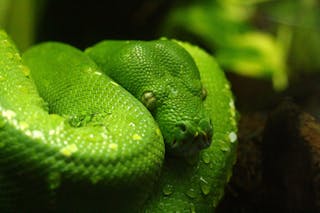
Sneezing may seem like a minor problem, but if your pup is experiencing it with regularity, you might be concerned. Fortunately, there are a variety of potential causes for sneezing in dogs and in most cases, these can be quickly and easily addressed.
The first potential cause of sneezing could be that your pup is dealing with environmental allergies. Allergens such as pollen and dust mites can irritate the nasal passages enough to cause frequent sneezing. If this is the case, take a look at the environment to determine what might be causing the issue and tackle it from there. Clean the home regularly—particularly bedding—to help limit dust mites, keep windows and doors closed during high pollen times (such as spring), and consider giving your pup an oatmeal-based bath to soothe any skin irritation or dryness that may have been caused by allergens.
Over-excitement can also lead to excessive sneezing in dogs who are prone to it; playful pups can end up wheezing or snorting due to their enthusiasm. Playtime is important for your pup's mental and physical health but make sure you keep it calm yet fun; try activities such as training games, lower-intensity game of fetch, or simply petting and cuddling for a few minutes during each session for an added bonding session.
In rarer cases of ongoing sneezing, a trip to the vet might be in order. This could be due to a respiratory infection or serious illness such as canine distemper or kennel cough; while vaccinations may help prevent against some illnesses, they are not foolproof so if your pup still has persistent symptoms that don’t improve after trying environmental adjustments, talk with your vet sooner rather than later.
In short: Sneezing comes from a variety of sources in dogs - ranging from allergies to over-excitement - so first assess the situation before jumping into any conclusions about what’s causing it. By finding out exactly why your particular pup is sneezing and addressing it appropriately (whether through environmental changes at home or an appointment with the vet), you should easily find relief from these pesky episodes!
Is my dog's sneezing normal?
Sneezing in dogs is usually a perfectly normal behavior, but it can sometimes signal an underlying health issue. So, if your dog is sneezing frequently or excessively, it’s important to figure out why.
The most common reason for a dog to be sneezing is due to allergens, such as dust particles or mold spores. Often, a bout of sneezing will pass once the irritant has been removed from the environment. If your house isn't particularly dusty or you don't have any known allergens in your home, you may want to consider taking your pup to the vet for an examination and further diagnosis.
Also consider if your pet has recently suffered an accident or trauma that could be causing them additional stress or pain which could manifest as excessive sneezing. In this case, it’s vital that you take them in for a physical examination and x-rays with their veterinarian in order to rule out any major health issues.
If the source of the problem cannot be removed from the environment or if no obvious trauma can be determined, there are some illnesses which might cause increased sneezing in dogs such as Kennel Cough and Upper Respiratory infections and other diseases that affect the respiratory tract like sinusitis and nasal mites. In this case it is important for a vet to diagnose the problem as some of these issues may require special antibacterial medications to treat along with antibiotics and/or vaccines depending on your pet’s age, breed and medical history.
Remember that if your pup's excessive sneezing seems serious and is accompanied by other symptoms (such as coughing, runny nose), visit the vet for proper diagnosis and treatment - because their health might depend on it!
What can I do if my dog keeps on sneezing?
When a dog sneezes, it can be caused by anything from mild allergies to a serious infection. If your pet keeps sneezing, it’s important to pay attention and seek professional help if the symptoms persist. It is also possible that environmental factors such as dust or pollen could be causing the issue.
The first step is to observe your pet closely. Pay attention to their behavior, diet and environment. If you’ve recently changed their food or moved them to a new location, these factors may be what’s causing the sneezing episodes. Additionally, being mindful of any recent exposure they may have had to contaminants or allergens can help you pinpoint what is causing the issue.
In most cases, basic home treatments are all that’s needed to stop your pet’s sneezing and clear up the irritation. A humidifier in their environment can help bring relief if they are suffering from congestion caused by allergies while deep cleaning your furniture with a pet-safe cleaner on a regular basis will get rid of any lingering irritants in your home that could be triggering their issues. You may even consider giving them an over-the-counter antihistamine if recommended by your vet as some pets enjoy relief after taking it for as little as three days.
However, if at any point you notice that their condition worsens, do not hesitate to take them to see a qualified veterinarian for additional support and advice. They will run an in-depth examination and give targeted treatment plans specific for your pet’s needs in order for them to make a full recovery.
What are the causes of my dog's incessant sneezing?
It can be concerning when your pet starts sneezing frequently and incessantly. While the causes can vary, here are some of the most common reasons your pet might have a bout of frequent sneezing:
1) Potential Allergens: Pets, like us, can be allergic to certain things such as pollen, dust, dirt, or even certain foods. These allergens can cause frequent sneezing when your pet is exposed to them and is especially common during the spring or summer months. If you believe this may be the culprit behind your furry friend's coughing and sneezing fit it is important to limit their exposure to these potential allergens.
2) Respiratory Problems: Sneezing can also be indicative of deeper issues within your pet's respiratory system, such as Kennel Cough, which is a contagious upper respiratory infection that affects the trachea and lungs. Should you see signs of constant sneezing that don't improve after removing any potential allergens from your pal’s environment it would be best to take them to the vet for an examination.
3) Nasal Mites: These microscopic parasites feed off debris in the nasal passages causing severe irritation within these airways. Your pup might try to blow off any excessive mucus by frequent sneezing. Treatment for this type of condition is a vet prescribed medication that lasts about 4 weeks and should reduce the amount of sneezes drastically.
In order for you to treat any issue behind your pet's frequent sneezes it is important to visit a veterinarian so they can determine what is causing this change in behavior and they will create an action plan based on what they find during their examination.
How can I stop my dog's sneezing?
When it comes to pesky pet problems, a dog’s sneezing can quickly become hated household sound. But worry not, it likely has a fixable cause. Here are some steps to take to stop your pup’s sneezing and keep your home a healthier, more peaceful environment.
First, assess the environment where most of the sneezing is occurring and look for potential sources of triggers that could be causing the sneezing. These can include dust mites, pollen, mold and dander coming from other pets or household items like carpets, furniture or drapes. If any of these are suspected allergens try vacuuming regularly and washing any throw pillows or washable materials with unscented detergents in hot water.
Another thing you should consider is whether or not your pup requires certain seasonal allergy medications so they are better able to combat exposure to allergens. Check with your veterinarian to see if this is a viable solution for your pup. They may also suggest antihistamines as well as even nasal washes which can help clear debris in the nasal passages and keep them free of irritants like dust mites and pollen.
If despite all these suggested measures your pup's sneezing persists, it’s time for another visit to the vet as there may be underlying health issues at play that require attention like an infection of their respiratory system. Though this should never be ruled out first off due a pup’s behavior changing without an obvious environmental cause. Being proactive about any pet problems can make sure that small irritations don’t turn into major health issues in the future!
Are there any home remedies for a dog with a sneezing problem?
Dogs tend to sneeze from time to time, and it is usually nothing to worry about. However, persistent sneezing may indicate that your pup is suffering from some kind of allergy or infection. The good news is that there are a few simple home remedies you can try before resorting to medications prescribed by a veterinarian.
The first and most important remedy for a sneezing dog is keeping the air clean and free of allergens. This means reducing pet dander, which is caused by shedding fur, using an air filter in the room where your pup hangs out and frequently vacuuming furniture to trap dust mites or pollen that may be in the home and causing irritation. In addition, you can also consider placing your pup's bedding outside when possible to give it an opportunity to air out and limit the allergen exposure.
Another remedy for a sneezing dog is steam therapy. Steaming up your bathroom with hot water, or even running a cool mist humidifier in your pup's room can help open up the nasal passageway and reduce any congestion causing the sneezing. You can also add some eucalyptus oil or menthol drops in the steam for further relief!
Finally, some herbs may be beneficial for soothing irritated tissue inside of your pup's nose. Adding honey or slippery elm extract mixed with warm water into their food can provide some relief from tickling allergies or infections too! Just remember, if these home remedies do not work within 24 hours of starting them then you should seek out professional medical advice from a veterinarian.



